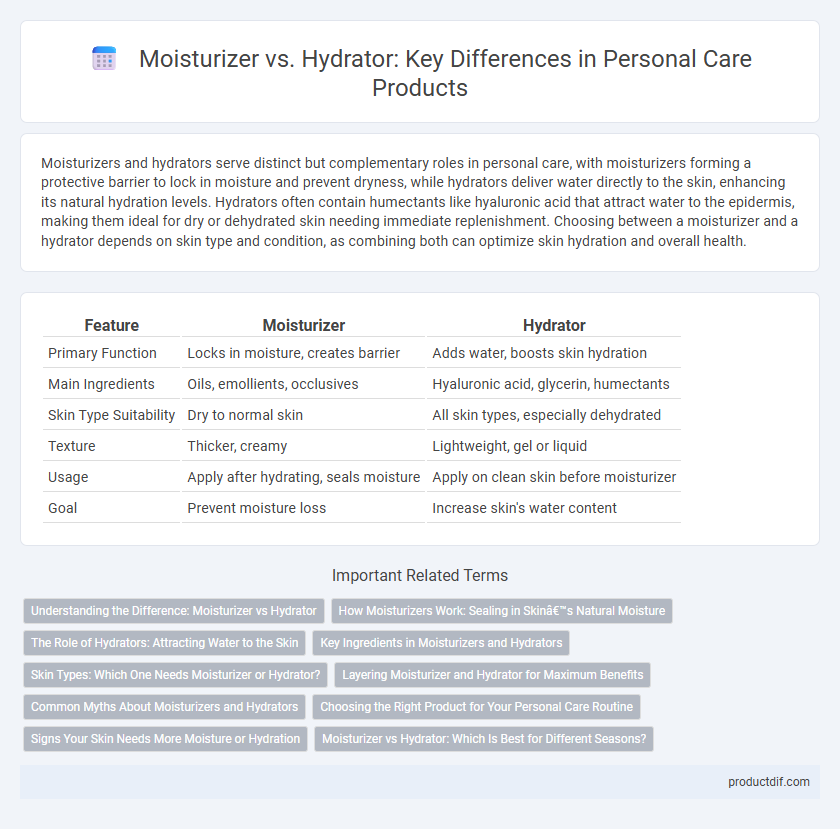Moisturizers and hydrators serve distinct but complementary roles in personal care, with moisturizers forming a protective barrier to lock in moisture and prevent dryness, while hydrators deliver water directly to the skin, enhancing its natural hydration levels. Hydrators often contain humectants like hyaluronic acid that attract water to the epidermis, making them ideal for dry or dehydrated skin needing immediate replenishment. Choosing between a moisturizer and a hydrator depends on skin type and condition, as combining both can optimize skin hydration and overall health.
Table of Comparison
| Feature | Moisturizer | Hydrator |
|---|---|---|
| Primary Function | Locks in moisture, creates barrier | Adds water, boosts skin hydration |
| Main Ingredients | Oils, emollients, occlusives | Hyaluronic acid, glycerin, humectants |
| Skin Type Suitability | Dry to normal skin | All skin types, especially dehydrated |
| Texture | Thicker, creamy | Lightweight, gel or liquid |
| Usage | Apply after hydrating, seals moisture | Apply on clean skin before moisturizer |
| Goal | Prevent moisture loss | Increase skin's water content |
Understanding the Difference: Moisturizer vs Hydrator
Moisturizers primarily seal in water and create a protective barrier to prevent moisture loss, while hydrators increase the skin's water content by attracting and binding water molecules. Ingredients like hyaluronic acid and glycerin are common in hydrators due to their humectant properties, whereas moisturizers often contain occlusives such as petrolatum or oils to lock in hydration. Understanding this difference helps in choosing the right product for maintaining optimal skin hydration and preventing dryness.
How Moisturizers Work: Sealing in Skin’s Natural Moisture
Moisturizers work by creating a protective barrier on the skin's surface that locks in natural moisture and prevents water loss, promoting long-lasting hydration. Ingredients like occlusives, such as petrolatum and dimethicone, effectively seal in moisture, while emollients soften and smooth the skin. Unlike hydrators that add water-attracting humectants, moisturizers primarily focus on maintaining the skin's moisture balance by preventing dehydration.
The Role of Hydrators: Attracting Water to the Skin
Hydrators play a crucial role in skincare by attracting water molecules to the skin's surface, enhancing overall moisture levels and maintaining skin elasticity. Ingredients like hyaluronic acid and glycerin are key hydrators that bind water to the skin, creating a plump, hydrated appearance. Unlike moisturizers, which create a barrier to lock in moisture, hydrators focus on drawing hydration from the environment and deeper skin layers to improve skin texture and suppleness.
Key Ingredients in Moisturizers and Hydrators
Moisturizers typically contain occlusive agents such as petrolatum and dimethicone that create a barrier to prevent water loss, alongside emollients like shea butter to soften the skin. Hydrators primarily use humectants such as hyaluronic acid and glycerin that attract and retain moisture within the skin layers. Both key ingredients are essential for maintaining skin hydration but function differently by either locking in moisture or enhancing water absorption.
Skin Types: Which One Needs Moisturizer or Hydrator?
Moisturizers are ideal for dry and sensitive skin as they create a barrier to lock in moisture and prevent water loss, while hydrators are best suited for oily and combination skin because they boost water levels without adding oil or heaviness. Individuals with normal skin can benefit from hydrators to maintain hydration balance, whereas those with very dry or mature skin require richer moisturizers to restore and protect the skin's lipid layer. Choosing between a moisturizer and hydrator depends on skin type, hydration needs, and whether the skin requires barrier reinforcement or improved water retention.
Layering Moisturizer and Hydrator for Maximum Benefits
Layering a hydrator under a moisturizer enhances skin hydration by delivering water at a cellular level, while the moisturizer seals in moisture and provides a protective barrier. Hydrators typically contain humectants like hyaluronic acid that attract water, and moisturizers include occlusive and emollient ingredients to prevent water loss. Combining these two products optimizes skin texture, improves elasticity, and maintains long-lasting hydration throughout the day.
Common Myths About Moisturizers and Hydrators
Moisturizers and hydrators serve distinct roles in skincare, often misunderstood due to common myths; moisturizers seal in moisture with occlusive ingredients, while hydrators infuse water directly into the skin using humectants like hyaluronic acid. Many believe moisturizers alone hydrate the skin, but hydrators increase water content before moisturizers lock it in to prevent dehydration. Clarifying these functions enhances skin health by promoting proper product layering and targeted hydration strategies.
Choosing the Right Product for Your Personal Care Routine
Moisturizers create a protective barrier to lock in hydration and replenish the skin's natural oils, ideal for dry or sensitive skin types needing long-lasting moisture retention. Hydrators, often containing humectants like hyaluronic acid, attract and bind water to the skin, making them perfect for enhancing skin's water content and providing a lightweight boost of hydration. Selecting the right product depends on your skin's specific needs: use a hydrator for added moisture and a moisturizer to seal that moisture and prevent dryness.
Signs Your Skin Needs More Moisture or Hydration
Dullness, tightness, and flaky patches are clear signs your skin needs more moisture, indicating a lack of lipids to lock in hydration. Fine lines and a rough texture suggest dehydration, where the skin lacks water content despite feeling oily or balanced. Regular use of a moisturizer helps restore the skin barrier by sealing in water, while hydrators boost water levels to maintain elasticity and suppleness.
Moisturizer vs Hydrator: Which Is Best for Different Seasons?
Moisturizers create a protective barrier by locking in moisture, making them ideal for dry, cold winter months when skin tends to lose hydration. Hydrators, often containing humectants like hyaluronic acid, attract water to the skin and are better suited for humid or warm seasons, enhancing skin's natural moisture levels. Choosing between a moisturizer and hydrator depends on seasonal humidity and skin hydration needs to maintain optimal skin health year-round.
Moisturizer vs Hydrator Infographic

 productdif.com
productdif.com